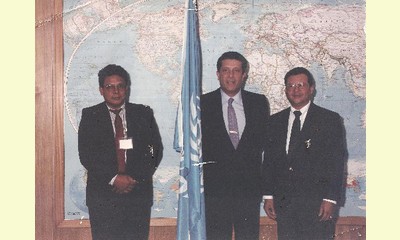|
|
The Culture of Peace in Nicaragua
un articulo por Carlos Tünnermann Bernheim (CPNN translation, abridged)
Although the initial steps of independence were achieved in Central peacefully , almost "like an academic debate" as it was described by the great Nicaraguan writer, José Coronel Urtecho , immediately afterwards civil war broke out , especially in Nicaragua . Since then, everything has been marked by conflict.

From left to right: Denis Torres, Director of the Institute "Martin Luther King" (IMLK); Federico Mayor Zaragoza, Director General of UNESCO; Sergio Denis García, Rector of the Universidad Politécnica de Nicaragua (UPOLI)
click on photo to enlarge
"History itself - continues Coronel - began to be lived and conceived as if it were a civil war . . . The conclusion to be drawn from these reflections by José Coronel Urtecho is that we have been dominated by the culture of violence . Consequently , the great challenge we face as Nicaraguans is to replace the culture of violence by a genuine culture of peace.
In this task, one must recognize the outstanding work in Nicaragua over the course of the last 20 years by the Martin Luther King Institute of Research and Social Action (IMLK ) of the Polytechnic University of Nicaragua (UPOLI ). It was founded in 1993, at a time when Nicaragua was recovering from a civil war that had devastated the country, ruined its economy and deeply divided the Nicaraguan people .
It was in these circumstances that the Institute was founded on the initiative of a team of teachers and researchers at UPOLI led by Denis Torres, who proposed to "raise, disseminate, and promote the creation of a new paradigm, recently promoted by UNESCO, the Culture of Peace".
The work conducted by the Institute is multifaceted and multidisciplinary , but it should be noted that the whole is impregnated with one main purpose : to work for the promotion of the paradigm in our society of the Culture of Peace, so that we get to build our own concept of it and takes root in the collective consciousness of Nicaraguans, to the extent that it gradually replaces the hitherto dominant culture of violence.
In my association with UNESCO, from the second half of the nineties, I can attest that the Institute was the first entity in the world to design a curriculum for teaching the culture of peace, which was greeted with enthusiasm by the Director General of UNESCO at that time, Federico Mayor Zaragoza.
The Institute designed the curriculum to be implemented by the University UPOLI whose authorities, then chaired by the rector Denis Sergio Garcia, enthusiastically identified with the paradigm of the Culture of Peace from the outset. Hence, the curriculum was incorporated as a compulsory subject in all majors offered at the University. . . .
The curriculum proposed by the Institute, with necessary adaptations, was then taken up by universities from seven countries in Latin America. In Nicaragua it is gradually being incorporated into teaching at several universities.
The most successful initiative of IMLK at a global level was the development and promotion in the year 2007, through the government of President Enrique Bolaños, the proposition to the General Assembly of the United Nations to declare the year 2009 "International Year of Reconciliation", which eventually was realized . . .
(Click here for a Spanish version of this article)
|








|
DISCUSSION
Pregunta(s) relacionada(s) al artículo :
Higher education for peace, How can young people find support for their studies?
* * * * *
Comentario más reciente:
:
The Michigan, USA Chapter of Veterans For Peace (Chapter 93) has a "Peace Studies Scholarship" for those from Michigan who are studying peace at an institution of higher education.

|
|









